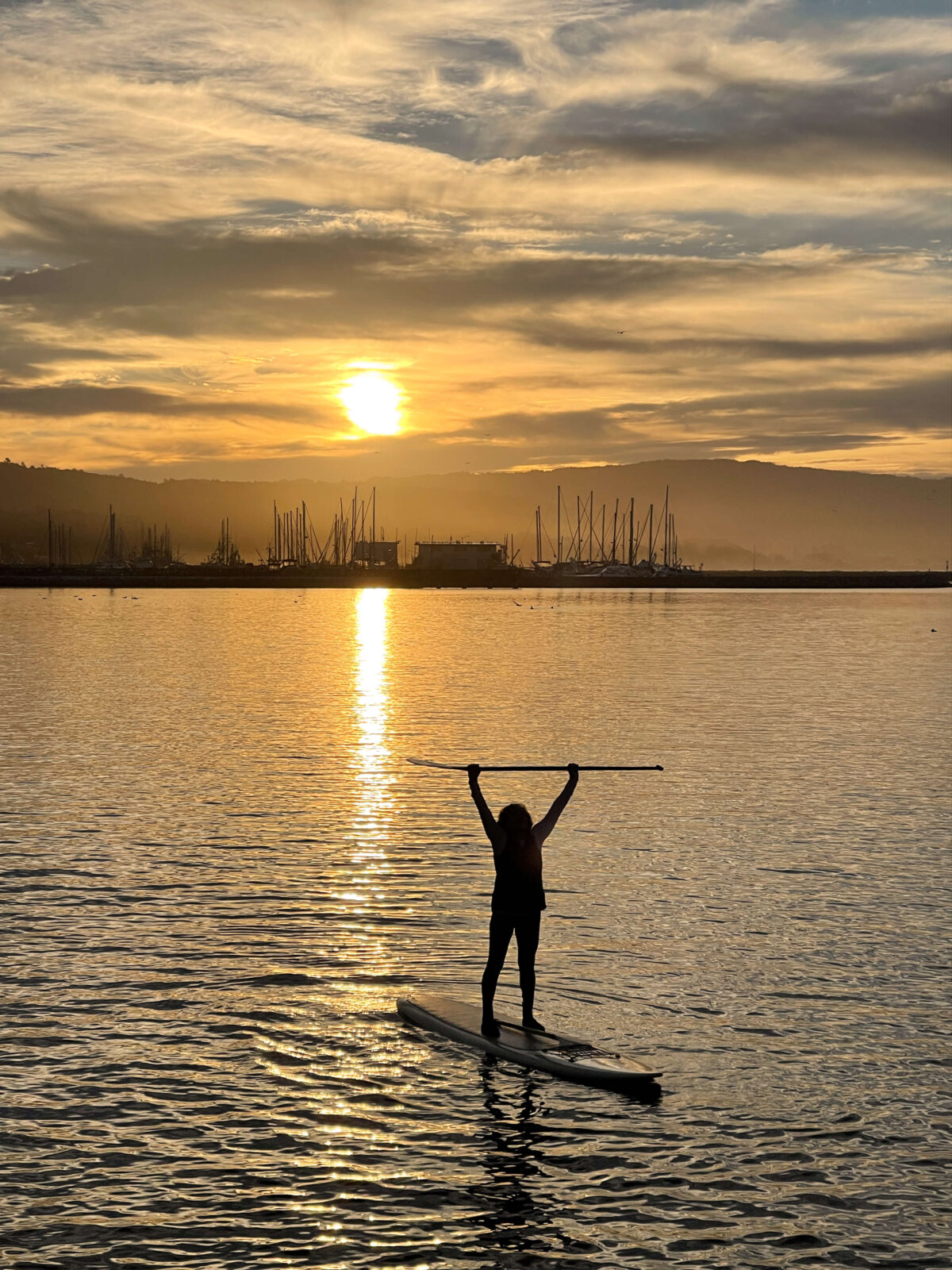Words by Sheri Baer
It’s a little after 7AM when Bird Levy rises to her feet on her standup paddleboard at Pillar Point Harbor in Half Moon Bay. Taking a confident stance, her knees slightly bent, she digs the paddle blade into the water and firmly pulls back. One stroke, then the next, then another, setting an almost meditative rhythm.
“It’s a spiritual experience to see that sun rising up over the mountain,” she says. “When the sun starts to shine on the water, it makes this huge beam and I just get on my board and paddle that sunbeam.”
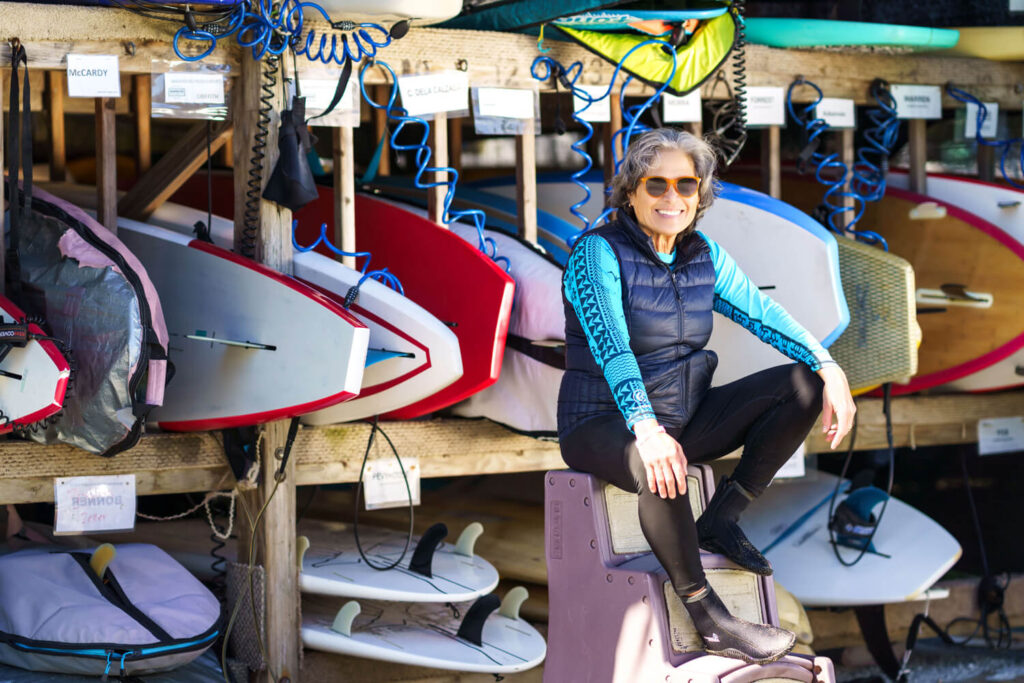
But for the barking of harbor seals and the gentle squawking of seabirds, the air feels soft and quiet. For Bird, this is the magic hour, the time to release any unsettled thoughts, worries or fears. “I call this pono padding,” she says. “Back home, pono means to make things right, to balance your life. For me, it means to put your troubles in the water, to let the tide just take them away.”
‘Back home’ is Hawaii, where Bird was born and raised on and off throughout her childhood. Half-native Hawaiian, her life has always been oriented around the ocean. “My mother and all the women, the wahine, in my family, they were all waterwomen,” she says. “We were just born on the water. I actually call the ocean Mama Moana because she is like my mother.”
As an instructor at Mavericks PaddleSports, Bird strives to share that connection with her students, to help them find that same healing, that same comfort from her beloved ocean. It’s an inclusive invitation that she extends to anyone. Bird herself discovered standup paddleboarding, or SUP, when she was 54. She is now edging 70.
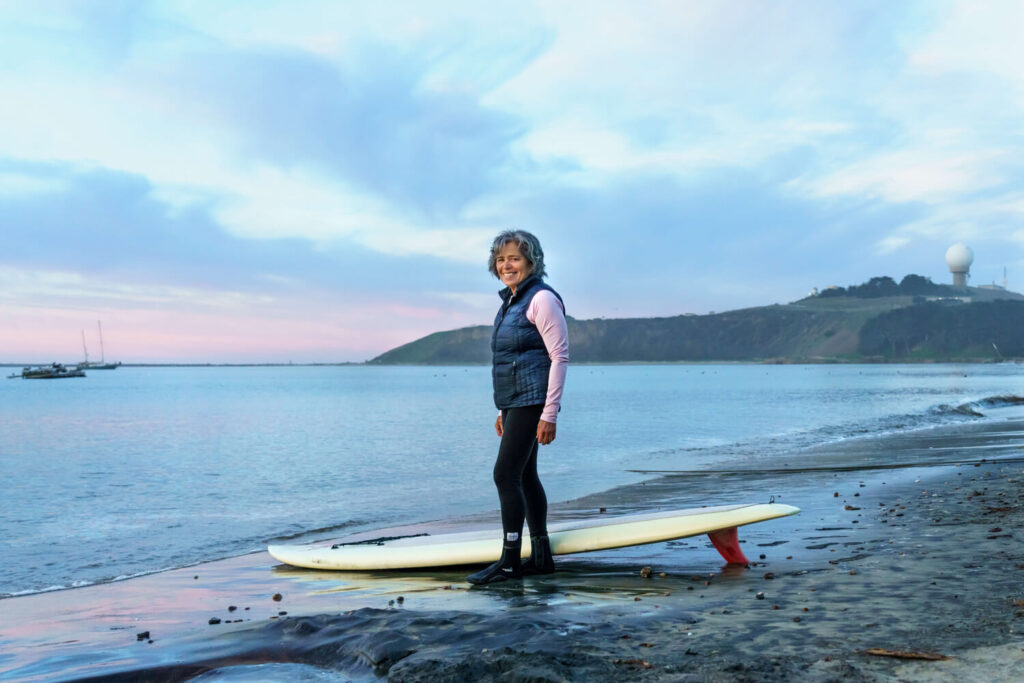
Originally from the west side of Oahu, Bird still refers to herself as a Nanakuli girl after her hometown. Like many in Hawaii, Bird’s first water sport was outrigger paddling. “As a kid in Hawaii, everybody paddles canoes,” she says, “whether it’s for fun or competitive.” Bird’s parents ventured back and forth between Hawaii and the mainland, and Bird lived in Southern California before moving up to the Bay Area, where she attended high school. The one constant was living coastal. “There was always the ocean,” she says. “It was always there for us.”
As life unfolded, Bird maintained close proximity to the ocean, but work and family responsibilities constrained her time on the water. After starting out in the wholesale garment business, she married attorney Terry Strain and gravitated into the law field as an administrative assistant. It was while she was working at a San Francisco firm that Bird finally returned to her cultural sport of canoe paddling. She joined the San Francisco Outrigger Canoe Club. The year was 2002 and Bird had just turned 50. “That started a wonderful six-year growth period when I participated in many regattas,” she recounts. “Many medals followed and I made lifelong friends, but by 2007, my body was feeling the aches and pains of the sport.”
Around that time, Bird made a trip home to Oahu where she met up with her dear friend and mentor, Hawaiian legendary waterman Joe Momoa. At Pokai Bay on Oahu’s west side, Bird spotted Momoa paddling on what looked like a big surfboard. “He was just gliding on the water, and he looked like a king,” she recalls. “He said, ‘Try it, Bird! Get on the board. You can do it!’”
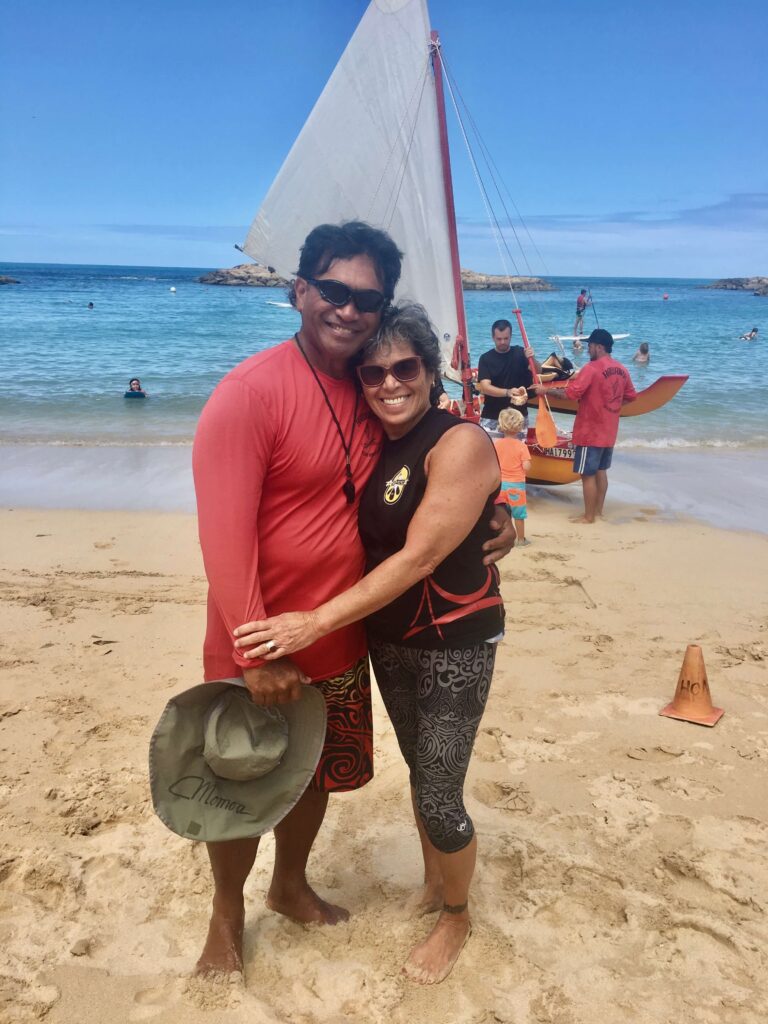
Bird found herself paddling way out in the ocean: “I stood up right away and didn’t fall in. It was so beautiful. I looked back at my childhood place, the beautiful green Waianae mountain range and the clear, clear blue ocean. And then dolphins jumped up and put on a spectacular show, doing hula for us. I knew that this was my sport for my kupuna, my elder, years. I was overwhelmed with joy knowing I would not have to separate myself from Mama Moana.”
For the next two weeks, Bird paddled up and down Oahu’s Waianae coast. She returned to the Bay Area determined to buy herself a board and get out on the water. Having heard about Jeff Clark’s Mavericks Surf Shop in Half Moon Bay, she went over to check it out. “Jeff lent me his personal board and asked me, ‘Are you going to be all right?’” she recounts with a chuckle. “I said, ‘Yeah, I’ll be fine.’ Jeff said he watched me and was like, ‘Oh, this chick has got it down!’”
By the time Jeff and Cassandra Clark opened Mavericks Paddle-Sports in 2015, Bird had mastered SUP and was ready to be an instructor. “I felt really confident that I could teach other people,” she says, “and also that I could impart my ocean manao, my ocean knowledge, what I’ve learned throughout my life.”
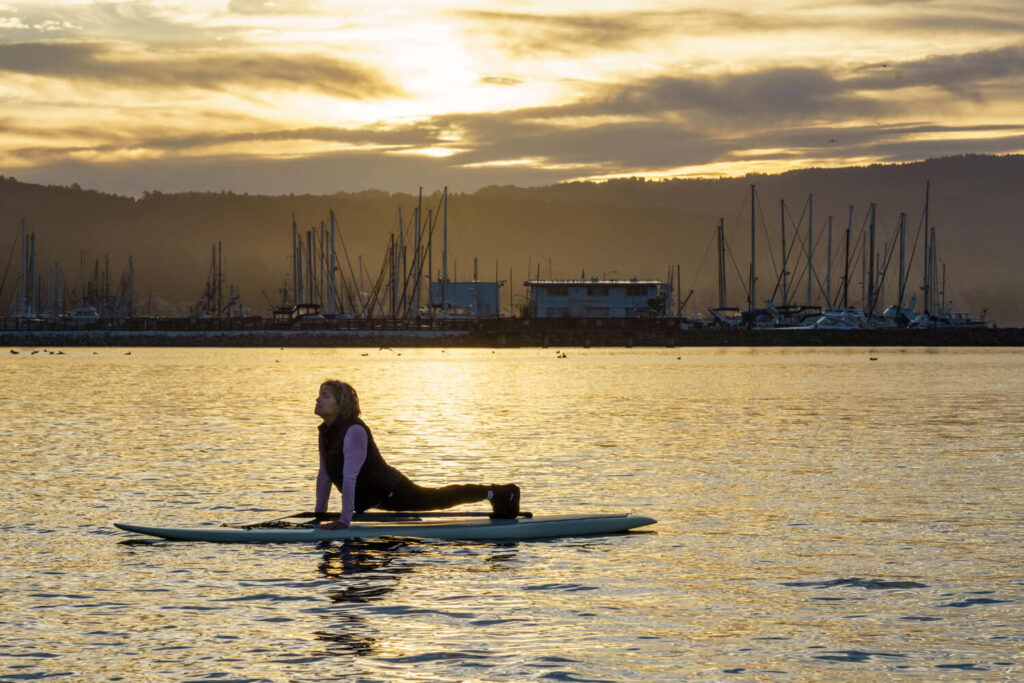
On a recent Sunday morning, Bird, at 5’2”, appears to effortlessly lift down paddleboards from racks at Mavericks PaddleSports. “Grab it by the handle in the middle,” she instructs her haumana, or students, as they carry their boards and paddles down to the water’s edge. The median age in this particular class looks to be 50ish but according to Bird, SUP has no age, gender or ability restrictions. “It’s very accessible,” she notes. “I’ve taken out so many families; kids get their own little boards and paddles. I’ve taken out people who are afraid of the water and ones who think they’re not in shape or too old.”
After Bird relays initial instructions and safety guidance, the paddlers enter the water, starting out on their knees, until they’re ready to stand. Bird glides by, offering encouraging words and practical tips. How to breathe. Where to look. What to do if there’s a wake from a boat. “If you can propel yourself forward using the technique I teach people, it also propels your life, your inner spirit,” observes Bird. “When they first get on the water, they are all hunched over, their knees are shaking. But when they get off the board, they’re standing up straight, walking taller and they’re proud of what they did.”
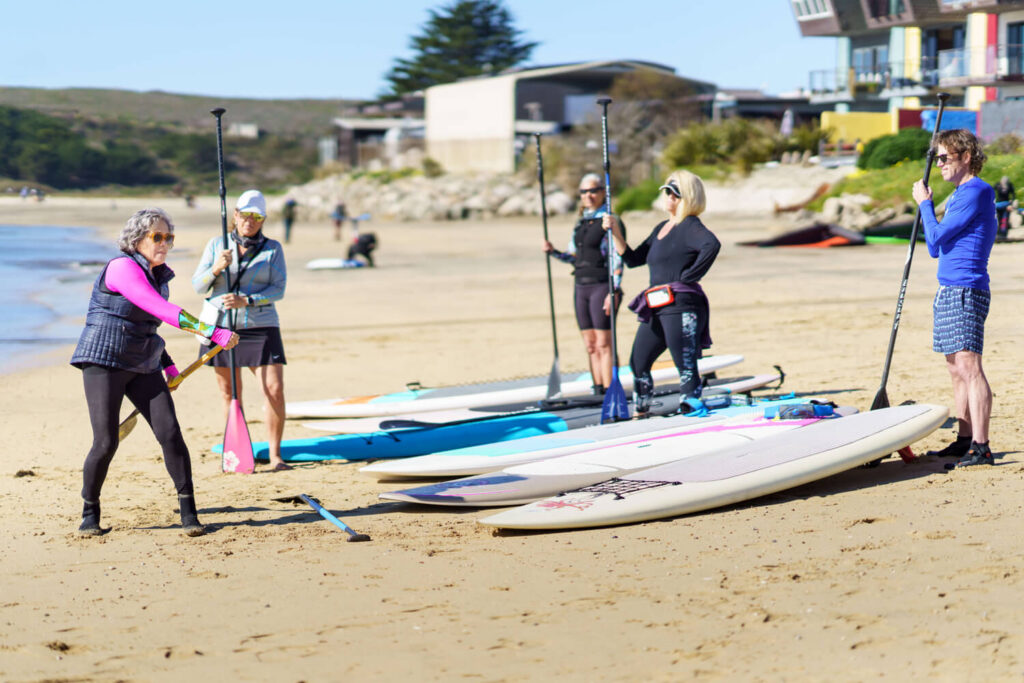
Among the morning paddlers out on the water is Georgina Fox, a self-proclaimed SUP convert. A former gym rat and runner, she found herself searching for a new outlet in 2020. On a visit to Half Moon Bay, she caught sight of Bird teaching a class and booked a lesson. “I was on a natural high the rest of the day,” she recounts. “I started coming every weekend.” Before long, Georgina bought her own board so that she can paddle anytime she wants. “I thought Bird was crazy to come out here so early in the morning, but now I’m doing it too,” she says. “It’s just so peaceful. It’s like my church. It’s where I get my serenity.”
Teaching SUP classes keeps Bird busy, along with her three children and six grandchildren. “I truly believe that it’s our kuleana, our responsibility, to teach whatever we can in our lives to others,” she says. “I believe we have a spiritual connection with the ocean, and it’s such a wonderful thing for me when I can help people discover it.”
Bird instinctively knew when it was time to relinquish her canoe paddling days. How long does she see herself doing SUP? “I plan to paddle until I can’t paddle anymore,” she responds. “I honor my body and so when that time comes…” Bird stops and considers what she’s saying. “Actually,” she amends, “I don’t think it will.”
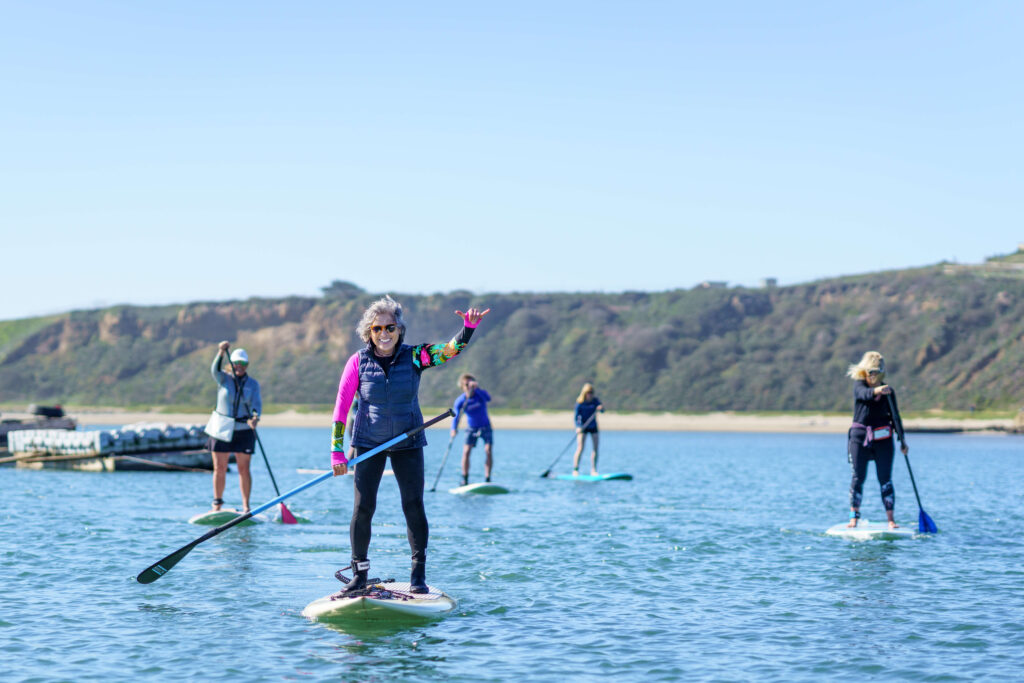
Auntie Bird’s Paddling Tips
+ Your breathing calms you down. Everything comes from your core in this sport. We call it na’au in Hawaiian, your gut. If you can get your core calm, the rest of your body will follow. Breathe in through your nose and out through your mouth. It helps calm your na’au.
+ The whole object of this sport is to propel yourself forward. Bending your knees will give you leverage and help you balance. Use your upper body strength and core to grip that paddle, dig the blade into the water and pull it back. Propel. Propel. Propel.
+ I always encourage people to not look at the water when they are out there. Focus on a spot in the distance, something you can visualize and paddle towards. The moving water sends a message to the brain and your body tends to go with that gravitational pull. If you keep looking at the water, the next thing you know, you’re in it!
+ If you fall in, you don’t need to worry. Your body is attached to the board by a leash. All you need to do is float over to the board, get right in the middle of it and hoist yourself up. It’s a metaphor for life. We all fall, but we get back up.


